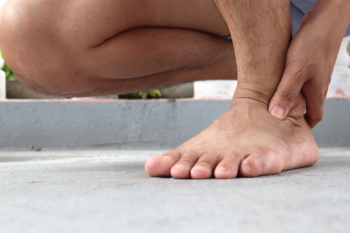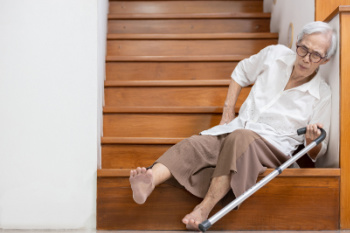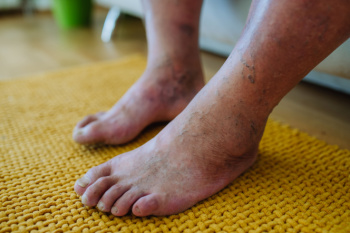Connect With Us
Blog
Items filtered by date: February 2025
Peripheral Neuropathy Occurs When Nerves Stop Communicating Properly

Peripheral neuropathy occurs when nerves outside the brain and spinal cord become damaged, disrupting signals between the brain, spinal cord, and the rest of the body. This can lead to numbness, tingling, burning, or weakness, often starting in the feet. Causes vary but include diabetes, infections, vitamin deficiencies, and prolonged pressure on nerves. People with neuropathy may struggle with balance, coordination, and even simple tasks like walking or sensing temperature changes. Over time, nerve damage can worsen, leading to foot injuries or ulcers that may go unnoticed due to reduced sensation. Treatment focuses on managing the underlying cause, relieving symptoms, and preventing complications. Medications, lifestyle changes, and targeted exercises can help improve nerve function. Proper foot care is essential to avoid further injury. If you are experiencing unexplained foot pain, numbness, or weakness, it is suggested that you see a podiatrist for evaluation and appropriate care.
Neuropathy
Neuropathy can be a potentially serious condition, especially if it is left undiagnosed. If you have any concerns that you may be experiencing nerve loss in your feet, consult with one of our podiatrists from Family Foot and Ankle Care of Moriches. Our doctors will assess your condition and provide you with quality foot and ankle treatment for neuropathy.
What Is Neuropathy?
Neuropathy is a condition that leads to damage to the nerves in the body. Peripheral neuropathy, or neuropathy that affects your peripheral nervous system, usually occurs in the feet. Neuropathy can be triggered by a number of different causes. Such causes include diabetes, infections, cancers, disorders, and toxic substances.
Symptoms of Neuropathy Include:
- Numbness
- Sensation loss
- Prickling and tingling sensations
- Throbbing, freezing, burning pains
- Muscle weakness
Those with diabetes are at serious risk due to being unable to feel an ulcer on their feet. Diabetics usually also suffer from poor blood circulation. This can lead to the wound not healing, infections occurring, and the limb may have to be amputated.
Treatment
To treat neuropathy in the foot, podiatrists will first diagnose the cause of the neuropathy. Figuring out the underlying cause of the neuropathy will allow the podiatrist to prescribe the best treatment, whether it be caused by diabetes, toxic substance exposure, infection, etc. If the nerve has not died, then it’s possible that sensation may be able to return to the foot.
Pain medication may be issued for pain. Electrical nerve stimulation can be used to stimulate nerves. If the neuropathy is caused from pressure on the nerves, then surgery may be necessary.
If you have any questions, please feel free to contact our offices located in Moriches and Shirley, NY . We offer the newest diagnostic and treatment technologies for all your foot care needs.
Wounds That Don't Heal Need to Be Checked
Preventing Falls in Seniors

Falls pose a significant threat to the health of seniors, often leading to serious injuries such as fractures or head trauma. The risk of falling increases as balance and coordination naturally decline with age, making it harder for older adults to move safely. In addition to physical changes, issues like poor vision or medication side effects can contribute to the risk of falls. That is why it is vital for seniors to have regular eye exams to ensure their vision is sharp and clear. Properly correcting vision can significantly reduce the chances of missteps or accidents. Maintaining good balance through exercises like tai chi or strength training can also improve stability and reduce the risk of falls. In the home, removing clutter and installing safety features such as grab bars can further enhance safety. Falling can seriously impact foot health. If this has happened to you, it is suggested that you consult a podiatrist who can offer effective relief and treatment tips, and guide you on additional fall prevention techniques.
Preventing falls among the elderly is very important. If you are older and have fallen or fear that you are prone to falling, consult with one of our podiatrists from Family Foot and Ankle Care of Moriches. Our doctors will assess your condition and provide you with quality advice and care.
Every 11 seconds, an elderly American is being treated in an emergency room for a fall related injury. Falls are the leading cause of head and hip injuries for those 65 and older. Due to decreases in strength, balance, senses, and lack of awareness, elderly persons are very susceptible to falling. Thankfully, there are a number of things older persons can do to prevent falls.
How to Prevent Falls
Some effective methods that older persons can do to prevent falls include:
- Enrolling in strength and balance exercise program to increase balance and strength
- Periodically having your sight and hearing checked
- Discuss any medications you have with a doctor to see if it increases the risk of falling
- Clearing the house of falling hazards and installing devices like grab bars and railings
- Utilizing a walker or cane
- Wearing shoes that provide good support and cushioning
- Talking to family members about falling and increasing awareness
Falling can be a traumatic and embarrassing experience for elderly persons; this can make them less willing to leave the house, and less willing to talk to someone about their fears of falling. Doing such things, however, will increase the likelihood of tripping or losing one’s balance. Knowing the causes of falling and how to prevent them is the best way to mitigate the risk of serious injury.
If you have any questions, please feel free to contact our offices located in Moriches and Shirley, NY . We offer the newest diagnostic and treatment technologies for all your foot care needs.
How Running Injuries May Be Prevented

Preventing running injuries requires focusing on the health of your feet, toes, and ankles. New runners or those without prior sports experience should start with walking or partial weight-bearing activities to prepare their bodies for running. Gradually increasing training intensity can reduce stress on the feet, particularly for those recovering from past injuries. Experts recommend running no more than 40 miles per week and suggest balancing training frequency with adequate rest to prevent overuse injuries. Opting for soft running surfaces can decrease the negative impact on the feet and ankles. Stretching may improve flexibility, but consistency is important if included. Transitioning to a forefoot strike or minimalist shoes should be done gradually, paired with strengthening exercises for the foot muscles to avoid added strain. Regularly check the wear pattern of your shoes and consider replacing them if they are older than six months. Alternating between multiple pairs of shoes can also be beneficial. If you have sustained a running injury, it is suggested that you schedule an appointment with a podiatrist for a diagnosis and treatment options.
Exercising your feet regularly with the proper foot wear is a great way to prevent injuries. If you have any concerns about your feet, contact one of our podiatrists of Family Foot and Ankle Care of Moriches. Our doctors will treat your foot and ankle needs.
How to Prevent Running Injuries
Many common running injuries are caused by overuse and overtraining. When the back of the kneecap starts wearing out and starts causing pain in your knee, this is commonly referred to as runner’s knee. Runner’s knee is a decrease in strength in your quadriceps and can occur if you’re not wearing properly fitted or supporting shoes. To prevent runner’s knee, focusing on hip strengthening is a good idea, as well as strengthening your quads to keep the kneecaps aligned.
What Are Some Causes of Running Injuries?
- One cause of a common running injury is called iliotibial band syndrome.
- Plantar fasciitis is also another common injury.
- Stress fractures can occur from overtraining, lack of calcium, or even your running style.
Best Ways to Prevent Running Injuries
- Wear footwear that fits properly and suits your running needs.
- Running shoes are the only protective gear that runners have to safeguard them from injury.
- Make a training schedule. Adding strengthening exercises as well as regular stretching can help keep you strong and limber and can lessen the possibility of injuries.
- Stretching keeps muscles limber; this will help you gain better flexibility.
If you have any questions please feel free to contact our offices located in Moriches and Shirley, NY . We offer the newest diagnostic and treatment technologies for all your foot and ankle needs.
Foot-Related Complications From Diabetes

Diabetes can cause serious complications in the feet, toes, and ankles, especially if blood sugar levels are not well managed. Nerve damage, known as diabetic neuropathy, can lead to numbness or tingling, making it harder to notice injuries like cuts or blisters. Poor circulation, another common issue, reduces the blood flow to the lower limbs needed for healing, increasing the risk of ulcers or infections. Foot deformities, such as claw toes or changes in the arches, can create pressure points that increase the likelihood of injury. Without proper care, complications like deep infections or even gangrene may develop, sometimes resulting in limb loss if ignored. Regular foot exams and early detection of foot problems are vital for preventing these outcomes. A podiatrist can help by monitoring blood flow, nerve function, and skin health, as well as addressing issues such as ulcers, deformities, or poor footwear choices. If you have foot problems resulting from diabetes, it is suggested that you schedule regular appointments with a podiatrist who can to help manage them.
Diabetic foot care is important in preventing foot ailments such as ulcers. If you are suffering from diabetes or have any other concerns about your feet, contact one of our podiatrists from Family Foot and Ankle Care of Moriches. Our doctors can provide the care you need to keep you pain-free and on your feet.
Diabetic Foot Care
Diabetes affects millions of people every year. The condition can damage blood vessels in many parts of the body, especially the feet. Because of this, taking care of your feet is essential if you have diabetes, and having a podiatrist help monitor your foot health is highly recommended.
The Importance of Caring for Your Feet
- Routinely inspect your feet for bruises or sores.
- Wear socks that fit your feet comfortably.
- Wear comfortable shoes that provide adequate support.
Patients with diabetes should have their doctor monitor their blood levels, as blood sugar levels play such a huge role in diabetic care. Monitoring these levels on a regular basis is highly advised.
It is always best to inform your healthcare professional of any concerns you may have regarding your feet, especially for diabetic patients. Early treatment and routine foot examinations are keys to maintaining proper health, especially because severe complications can arise if proper treatment is not applied.
If you have any questions please feel free to contact our offices located in Moriches and Shirley, NY . We offer the newest diagnostic and treatment technologies for all your foot and ankle needs.
Blog Archives
- April 2025
- March 2025
- February 2025
- January 2025
- December 2024
- November 2024
- October 2024
- September 2024
- August 2024
- July 2024
- June 2024
- May 2024
- April 2024
- March 2024
- February 2024
- January 2024
- December 2023
- November 2023
- October 2023
- September 2023
- August 2023
- July 2023
- June 2023
- May 2023
- April 2023
- March 2023
- February 2023
- January 2023
- December 2022
- November 2022
- October 2022
- September 2022
- August 2022
- July 2022
- June 2022
- May 2022
- April 2022
- March 2022
- February 2022
- January 2022
- December 2021
- November 2021
- October 2021
- September 2021
- August 2021
- July 2021
- June 2021
- May 2021
- April 2021
- March 2021
- February 2021
- January 2021
- December 2020
- November 2020
- October 2020
- September 2020
- August 2020
- July 2020
- June 2020
- May 2020
- April 2020
- March 2020
- February 2020
- January 2020
- December 2019
- November 2019
- October 2019
- September 2019
- August 2019
- July 2019
- June 2019
- May 2019
- April 2019
- March 2019
- February 2019
- January 2019
- December 2018
- November 2018
- October 2018
- September 2018
- August 2018
- July 2018
- June 2018
- May 2018
- April 2018
- March 2018
- February 2018
- January 2018
- December 2017
- November 2017
- October 2017
- September 2017
- August 2017
- July 2017
- June 2017
- May 2017
- April 2017
- March 2017
- February 2017
- January 2017
- December 2016
- November 2016
- October 2016
- September 2016
- August 2016
- July 2016
- June 2016
- October 2015
- September 2015
- August 2015
- July 2015
- June 2015
- May 2015
- April 2015




